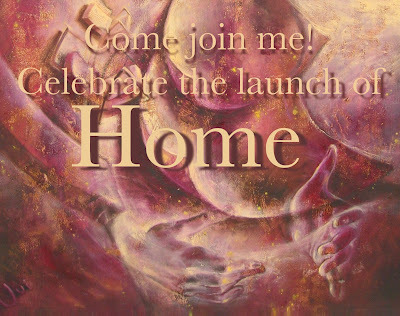Uvi Poznansky's Blog, page 263
October 1, 2012
Home: a Transformation
At the core, what does home mean to you? When you close your eyes, what image comes to mind? For me, the image that best captures the essence of this word was painted when I was ten years old. Outlined with simple pencil lines, brushed in a flat manner with Gouache paints, and perceived through a head-on perspective, this is a scene of the 'golden age' of my family:
Here we are, my father, mother and I, dancing the Twist (or at least, learning to do so) in unison. In the left corner you can spot the radio (set on an end table); in the right corner is a hanging lamp, on the wall over our head is a framed landscape, under our feet is a beautiful persian rug, the pillows on the red sofa seem to dance as well, or at least they are balanced on a point... And most importantly, all three of us are feeling the same beat. This, to me, is not just a picture of home; it is a picture of happiness. It is what was lost in later years, when my parents separated.
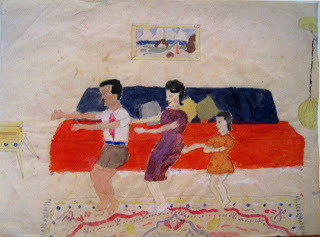
Later in his life, when left alone in this space, my father painted it and through the walls he connected it to the memory of his childhood home. You can see the same red sofa, the framed landscape, the Persian rug... But not a living soul. The place is empty, and he filled it but conjuring the image of his mother rocking the cradle.
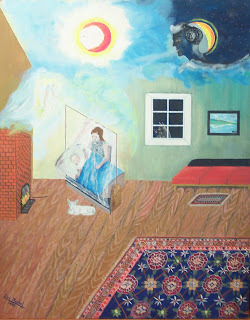
Later still, when he passed away, this space transformed once again in my mind. The landscape faded away from its frame, and it is barely hanging, barely clinging to the wall. The designs on the Persian rug have faded out too. It has multiplied into layers of blank paper that are swaying under your feet. The lamp is not just hanging, it is swinging wildly, giving a rhythm to the gusts of wind that threaten to destroy this place. It has already kicked the end table (where the radio used to stand in the first image, and where later my father would put his pen and notebook) upside down.
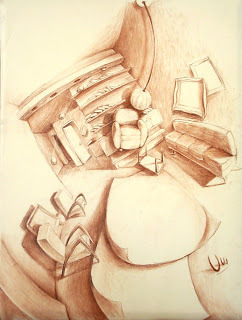 Which brings me to this moment, where again--to fill the emptiness of this space I conjured up a spirit, a muse that with great pity takes the place, in its entirety, into her arms; embraces it, and mourns not only the passing of my father, but all the lives lived between these walls, and moved on and away.
Which brings me to this moment, where again--to fill the emptiness of this space I conjured up a spirit, a muse that with great pity takes the place, in its entirety, into her arms; embraces it, and mourns not only the passing of my father, but all the lives lived between these walls, and moved on and away.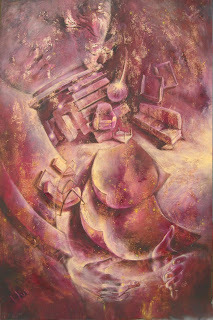
Published on October 01, 2012 14:04
September 27, 2012
The Place of Our Childhood: Paradise Lost?
Sometimes I think that once we leave home, a gate seems to close behind us. When we come back, things are never the same as they used to be. There is a separation, a thin, partially transparent film of memory, through which we see the place. In my mind, this is similar to the expulsion from the paradise, which I take to mean the early existence of our species. Our common childhood. We tend to think of paradise as a garden, not as a home. But in either case, there is that high, unsurmountable fence, and the ever-turning sword that cuts both ways, guarding it: the core of our beginnings. The time of our childhood. Our imagined happiness.
So today I chose to show you a detail from my paper sculpture, called Genesis. This story starts at the bottom, and snakes its way around the curved facets of the paper sculpture, starting with chaos, going through the separation of heaven and earth, creation of the sun, the moon and the stars, emergence of vegetation, life forms in the sea and on dry land, the tree of wisdom, the snake, Eve tempting Adam to eat the forbidden fruit, and ending at the top with the expultion from paradise.
The sculpture is constructed from three parts: The foot at the bottom, which I shaped as an elegant, curvy pedestal The faceted design in the middle, which I created out of a single sheet of paper, with no cutting or glueing at all (merely by light scoring and hand pressure)And the multi-pointed crown at the top, where the eye of God looking down on the tumult is painted (not visible here.) On each facet of the sculpture, I painted a different scene from the creation of the world. The lines of the design in one scene curve onto the next facet, the next scene. For example, the branches of the tree of knowledge rise into the top facet where the become the outline of the road leading away from the garden of Eden.
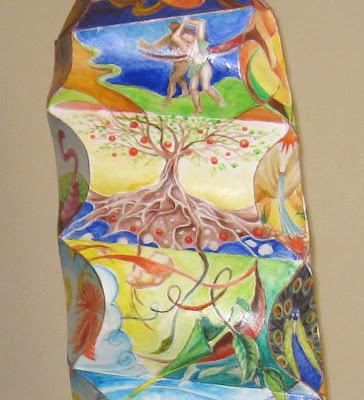
Take a closer look. You can click the paper sculpture to see it from more sides.
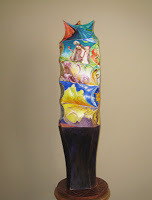
To see another one of my paper sculptures, click here.
So today I chose to show you a detail from my paper sculpture, called Genesis. This story starts at the bottom, and snakes its way around the curved facets of the paper sculpture, starting with chaos, going through the separation of heaven and earth, creation of the sun, the moon and the stars, emergence of vegetation, life forms in the sea and on dry land, the tree of wisdom, the snake, Eve tempting Adam to eat the forbidden fruit, and ending at the top with the expultion from paradise.
The sculpture is constructed from three parts: The foot at the bottom, which I shaped as an elegant, curvy pedestal The faceted design in the middle, which I created out of a single sheet of paper, with no cutting or glueing at all (merely by light scoring and hand pressure)And the multi-pointed crown at the top, where the eye of God looking down on the tumult is painted (not visible here.) On each facet of the sculpture, I painted a different scene from the creation of the world. The lines of the design in one scene curve onto the next facet, the next scene. For example, the branches of the tree of knowledge rise into the top facet where the become the outline of the road leading away from the garden of Eden.

Take a closer look. You can click the paper sculpture to see it from more sides.

To see another one of my paper sculptures, click here.
Published on September 27, 2012 13:14
September 25, 2012
Bring It Home
My upcoming poetry book is on three Goodreads lists right now. If you are a Goodreads member, please consider helping Home to become more visible, and vote for Home:
#325 on Best Indie Books Author #69 on Best Illustrated Book Covers #1177 on Can't Wait Books of 2012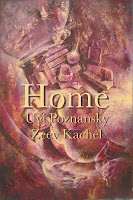

#325 on Best Indie Books Author #69 on Best Illustrated Book Covers #1177 on Can't Wait Books of 2012

Published on September 25, 2012 16:29
September 24, 2012
Stories My Father Told Me
"The longer I live, the more I realize that each one is only unto himself... Sometimes I shudder to see how lonely is a man in the universe. Only the noise, the tumult and the constant competition make him overlook this realization. The condition of the artist is immeasurably superior. The joy of inspiration puts his feeling of loneliness at a remote distance, and he imagines that life shall never end. But to create is possible only when a man can trust that he creates for someone or for some thing, that he is not surrounded by lies, and that he is not building upon a deceptive foundation."
These were my father's words to me on-tape, which he sent me when I moved to New York. For some reason, every time I listen they remind my of a time in my childhood: I remember him reading poems for me in languages I could not even understand. He would recite a few verses in Russian, stop, translate them for me on the fly, and continue with the next verse. By some trick, the images appeared before my eyes even before they words were decoded. His voice was grand with pathos. The pages would turn, each one a mystery, each one scribed in symbols I could not decipher on my own.
Of all the poems he used to read for me, there was one I was particularly drawn to: The Song of Oleg, written by Alexander Pushkin (the Russian poet whose career had come to an end in a duel, at the height of his genius.)
Oleg, the tale went, was a Russian prince who valued one thing above all his fine possessions: His horse. It was an exquisite animal and he simply adored it. More than that, there was a strong bond between them. But one day, an old prophet came to the prince and lifted the veil of the future for him. “O Prince,” he said, “it is from the steed which you love and on which you ride that you shall meet your death.”
His life was at stake, so Oleg felt compelled to make a painful sacrifice. He determined never to mount this horse or even to look upon it again. So he gave a command that the horse should be properly fed and taken care of, but never again should it be led into his presence.
Years passed, until one day he heard that the horse had died. “Soothsayers tell lies,” he said bitterly. “Their words are naught but falsehood. My horse is dead, but I am still alive.”
The prince rode to the place where the bare bones lay upon the earth. He dismounted, and remarked with a laugh: “Am I to receive my death from this skull?” Then he stood there, lost in abandon, reflecting on all those wasted years during which he and this beautiful being could have been close. Meanwhile, slithering out of the hollow of the skull, a snake crawled forth and with a single spurt, stung him to death.
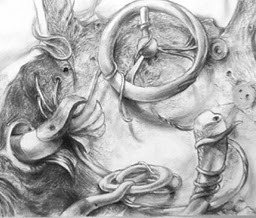
This image of the snake crawling forth to lay its claim upon the victim (who knows his fate and yet denies it) is still with me. This is, perhaps, the reason I hinted at it in a detail you can find at the bottom of my charcoal drawing, The Place Where I Played. Waiting there for me is the snake, ready to sting when while I am idling, yearning for what is gone, yearning for what I wish to have happened.
Such is the venom hidden in the gap between memory and reality.
These were my father's words to me on-tape, which he sent me when I moved to New York. For some reason, every time I listen they remind my of a time in my childhood: I remember him reading poems for me in languages I could not even understand. He would recite a few verses in Russian, stop, translate them for me on the fly, and continue with the next verse. By some trick, the images appeared before my eyes even before they words were decoded. His voice was grand with pathos. The pages would turn, each one a mystery, each one scribed in symbols I could not decipher on my own.
Of all the poems he used to read for me, there was one I was particularly drawn to: The Song of Oleg, written by Alexander Pushkin (the Russian poet whose career had come to an end in a duel, at the height of his genius.)
Oleg, the tale went, was a Russian prince who valued one thing above all his fine possessions: His horse. It was an exquisite animal and he simply adored it. More than that, there was a strong bond between them. But one day, an old prophet came to the prince and lifted the veil of the future for him. “O Prince,” he said, “it is from the steed which you love and on which you ride that you shall meet your death.”
His life was at stake, so Oleg felt compelled to make a painful sacrifice. He determined never to mount this horse or even to look upon it again. So he gave a command that the horse should be properly fed and taken care of, but never again should it be led into his presence.
Years passed, until one day he heard that the horse had died. “Soothsayers tell lies,” he said bitterly. “Their words are naught but falsehood. My horse is dead, but I am still alive.”
The prince rode to the place where the bare bones lay upon the earth. He dismounted, and remarked with a laugh: “Am I to receive my death from this skull?” Then he stood there, lost in abandon, reflecting on all those wasted years during which he and this beautiful being could have been close. Meanwhile, slithering out of the hollow of the skull, a snake crawled forth and with a single spurt, stung him to death.

This image of the snake crawling forth to lay its claim upon the victim (who knows his fate and yet denies it) is still with me. This is, perhaps, the reason I hinted at it in a detail you can find at the bottom of my charcoal drawing, The Place Where I Played. Waiting there for me is the snake, ready to sting when while I am idling, yearning for what is gone, yearning for what I wish to have happened.
Such is the venom hidden in the gap between memory and reality.
Published on September 24, 2012 14:52
September 23, 2012
Come Join Me!
Published on September 23, 2012 15:51
September 22, 2012
You Are My Ambassadors
You are my ambassadors; so wherever you are
Please carry my message, near and far
Let the ripple spread north and south
'Cause all I can hope for is your word-of-mouth
So if you you come here--if you find what you like
Please take your finger out the hole in the dike
Let the flood happen, let me float home
Like, tweet and chirp, from LA to Rome
From Tel Aviv to San Diego, from Sydney to Delhi
Don't hesitate, dear friends: go ahead, share me!
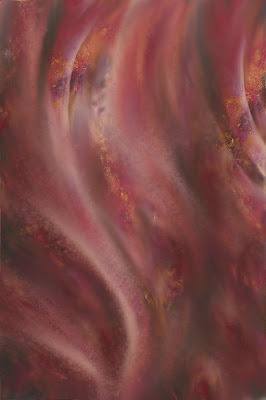

Please carry my message, near and far
Let the ripple spread north and south
'Cause all I can hope for is your word-of-mouth
So if you you come here--if you find what you like
Please take your finger out the hole in the dike
Let the flood happen, let me float home
Like, tweet and chirp, from LA to Rome
From Tel Aviv to San Diego, from Sydney to Delhi
Don't hesitate, dear friends: go ahead, share me!

Published on September 22, 2012 17:09
The Pen: Scribbles from Childhood
When I was a little girl, my father kept an on-going diary in which he jotted down his conversations with me. It was written almost like a play, centered on the dialog between us. Six years ago, when I came back to my childhood home to mourn him (during the Shiv-aa, the seven days period after his passing) I unearthed many of his long lost documents, and among them--the diary.
It is in a surprisingly great shape, despite the yellowing pages, and even if you don't know a word of Hebrew, you can appreciate his strong, fluent pen stroke and beautiful handwriting. It is firm even in the process of crossing out a few words.

This handwriting must have been on my mind when I wrote the opening lines of a short story, And Then She Left Him, which is included in my upcoming book, Home:
"He looks at the line. It is written in blue ink, pressed into the sheet of paper—vigorously here, faintly there—with his usual stroke, a stroke that drives through the spikes and valleys in the shapes of the letters at a steady slant. The line reaches the margin, where it is punctuated, unexpectedly, by a red stain.
Blotting it is bound to leave fingerprints, and so Mr. Schriber decides to leave it alone. He lifts the paper by its corner—and a drop bleeds down; he lays it down on the desk—and the stain goes on spreading. Going back to his writing, he applies too much pressure on the pen—and the pointed nib digs into the paper. Taking a deep breath, he tries to compose himself. The pen is his weapon. The simple act of pulling it over the soft, white surface has never failed to calm him down. Letter by letter, mark by mark, it will soon draw him into a different state of mind."
It is in a surprisingly great shape, despite the yellowing pages, and even if you don't know a word of Hebrew, you can appreciate his strong, fluent pen stroke and beautiful handwriting. It is firm even in the process of crossing out a few words.

This handwriting must have been on my mind when I wrote the opening lines of a short story, And Then She Left Him, which is included in my upcoming book, Home:
"He looks at the line. It is written in blue ink, pressed into the sheet of paper—vigorously here, faintly there—with his usual stroke, a stroke that drives through the spikes and valleys in the shapes of the letters at a steady slant. The line reaches the margin, where it is punctuated, unexpectedly, by a red stain.
Blotting it is bound to leave fingerprints, and so Mr. Schriber decides to leave it alone. He lifts the paper by its corner—and a drop bleeds down; he lays it down on the desk—and the stain goes on spreading. Going back to his writing, he applies too much pressure on the pen—and the pointed nib digs into the paper. Taking a deep breath, he tries to compose himself. The pen is his weapon. The simple act of pulling it over the soft, white surface has never failed to calm him down. Letter by letter, mark by mark, it will soon draw him into a different state of mind."
Published on September 22, 2012 16:37
September 21, 2012
The Best Review Ever
There are 34 eloquent, beautiful reviews on Amazon for my novel Apart From Love, but I have just received the one I consider the most rewarding of all! Check it out; this is why a writer writes:
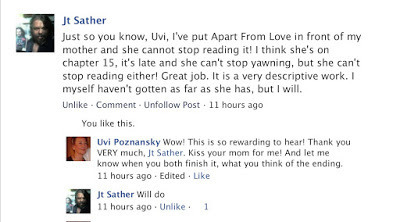


Published on September 21, 2012 08:41
September 20, 2012
How to Get the Vibrant Colors You've Expected for Your Cover
Being new to the printing process of book covers, I've learned that it can be a challenge to get graphics with the contrast and vibrancy you would expect. Home is the third cover I've designed this year, after Apart From Love and Ropes, Separation, Tear. In each case, the covers are based on my own art, and their colors (in print) turned up as radiant, and as faithful to the design as can be. It is so rewarding for me to hear the delight of those of you who got the paperback edition of my books.
So I can share this with you: here is an excellent article, a must read for anyone interested in getting the best result for their cover in print: Better Color from Print on Demand.
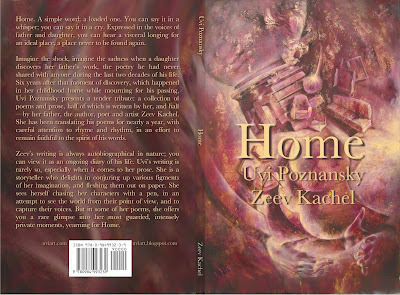
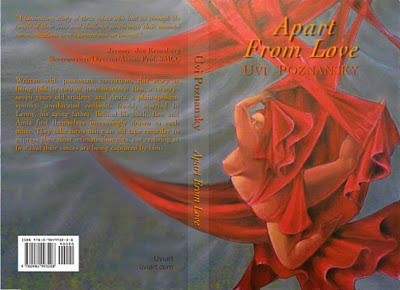
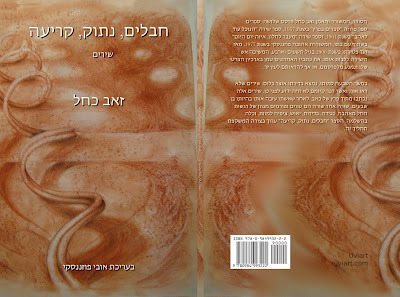

So I can share this with you: here is an excellent article, a must read for anyone interested in getting the best result for their cover in print: Better Color from Print on Demand.



Published on September 20, 2012 21:04
September 19, 2012
Review of Home by Hall of Fame Reviewer
Author of War Songs, Grady Harp is an artist representative, gallery owner, writer of essays and articles on figurative and all Representational art for museum catalogues and for travelling exhibitions, and an Amazon Hall of Fame Reviewer. He describes himself as being ever on the alert for the new and promising geniuses of tomorrow. So I am deeply honored that he has posted this five-star review (on Amazon and Goodreads) for Home:
"This is the second work by Uvi Poznansky that this reader has had the pleasure to absorb. And as written before in a small introduction to her life, the following is repeated: `Uvi Poznansky wears a coat of many colors. Originally from Israel where she studied Architecture and Town Planning then moving to the US where she studied Computer Science and became an expert in Software Engineering, Poznansky managed to combine the design elements of two studies into unique formats. And she has accomplished the same with the other side of her brain - making visual her ideas (she is an accomplished painter, drawer, and sculptor who has enjoyed exhibitions both in Israel and in California, her present base) and making words in poetry and in short stories and children's books.' And while all that was written before remains true, she has added a new facet to her art. HOME is an homage to her father, Zeev Kachel, an impressive poet who lived in Israel and during the last twenty years of his life he privately, secretly wrote poetry that has never been placed before the public until now. When Zeev Kachel died, Uvi discovered the poems and has translated them from Hebrew, publishing them here in tandem with her own poetry and short stories and embellishing them with her mystical artwork.
The theme is the concept of `home' as perceived by both father and daughter but not limited to their relationship or center of home: Uvi has been living in the USA while her father remained in Israel so there is a special tension within the works that negates space and time and yet celebrates it at the same time.
HOME by Uvi Poznansky, 2012
Sucked in by a force, I'm flying through a tunnel
The tunnel of memory that leads me back home
The past blurs my present, so my vision is double
The walls and the ceiling curve into a dome
From here I can see my home, tilting
And falling from place, all the lamps are aflame
My father's empty chair is slowly ascending
Tipped by the light, outlining its frame
And in A SENTENCE, UNFINISHED, a brief story, she includes the following:
Here is the poet, a man notorious for his contradictions, a man of great passion and an equally great skill to capture it, to put it in beautiful, eloquent words in any one of ten languages. Here is the storyteller whose listeners have left him. Locked in a world of no sound, in a world of no expression, here he is: a cage within a cage. This is the place where even the wolf surrenders. The fight is over. No more howling. ........ Here, at last, is my father.
And when we turn to the translations of the poetry of Zeev Kachel, the following is a brief example:
I'M NOT SORRY
I'm not sorry for the hours that I wasted
Suspended in my dreams and idle thought
I'm not sorry for the days I ruined
The only thing I care about is the luster I did blot
I care that that's the way our lives are going
In power games, for which we'll pay the price,
I ache, because of our misunderstanding
Because that which is between us turned hard as ice
I care nothing for the roses that have withered
Over their fleeting fragrance I will shed no tears
What pains me now is the way I hurt you
And that if I ask forgiveness, no one hears
No way to settle this, to heal the cuts
In this world there's a price for everything
The echo of our steps is the witness left behind us
As the light that glowed upon us is already blackening.
This radiant book is an exploration of the bond between a daughter and father and the book overflows with some of the most eloquent poetic moments in print. HOME is an invitation, a very personal one, and should not be passed over."

"This is the second work by Uvi Poznansky that this reader has had the pleasure to absorb. And as written before in a small introduction to her life, the following is repeated: `Uvi Poznansky wears a coat of many colors. Originally from Israel where she studied Architecture and Town Planning then moving to the US where she studied Computer Science and became an expert in Software Engineering, Poznansky managed to combine the design elements of two studies into unique formats. And she has accomplished the same with the other side of her brain - making visual her ideas (she is an accomplished painter, drawer, and sculptor who has enjoyed exhibitions both in Israel and in California, her present base) and making words in poetry and in short stories and children's books.' And while all that was written before remains true, she has added a new facet to her art. HOME is an homage to her father, Zeev Kachel, an impressive poet who lived in Israel and during the last twenty years of his life he privately, secretly wrote poetry that has never been placed before the public until now. When Zeev Kachel died, Uvi discovered the poems and has translated them from Hebrew, publishing them here in tandem with her own poetry and short stories and embellishing them with her mystical artwork.
The theme is the concept of `home' as perceived by both father and daughter but not limited to their relationship or center of home: Uvi has been living in the USA while her father remained in Israel so there is a special tension within the works that negates space and time and yet celebrates it at the same time.
HOME by Uvi Poznansky, 2012
Sucked in by a force, I'm flying through a tunnel
The tunnel of memory that leads me back home
The past blurs my present, so my vision is double
The walls and the ceiling curve into a dome
From here I can see my home, tilting
And falling from place, all the lamps are aflame
My father's empty chair is slowly ascending
Tipped by the light, outlining its frame
And in A SENTENCE, UNFINISHED, a brief story, she includes the following:
Here is the poet, a man notorious for his contradictions, a man of great passion and an equally great skill to capture it, to put it in beautiful, eloquent words in any one of ten languages. Here is the storyteller whose listeners have left him. Locked in a world of no sound, in a world of no expression, here he is: a cage within a cage. This is the place where even the wolf surrenders. The fight is over. No more howling. ........ Here, at last, is my father.
And when we turn to the translations of the poetry of Zeev Kachel, the following is a brief example:
I'M NOT SORRY
I'm not sorry for the hours that I wasted
Suspended in my dreams and idle thought
I'm not sorry for the days I ruined
The only thing I care about is the luster I did blot
I care that that's the way our lives are going
In power games, for which we'll pay the price,
I ache, because of our misunderstanding
Because that which is between us turned hard as ice
I care nothing for the roses that have withered
Over their fleeting fragrance I will shed no tears
What pains me now is the way I hurt you
And that if I ask forgiveness, no one hears
No way to settle this, to heal the cuts
In this world there's a price for everything
The echo of our steps is the witness left behind us
As the light that glowed upon us is already blackening.
This radiant book is an exploration of the bond between a daughter and father and the book overflows with some of the most eloquent poetic moments in print. HOME is an invitation, a very personal one, and should not be passed over."
Published on September 19, 2012 17:06

